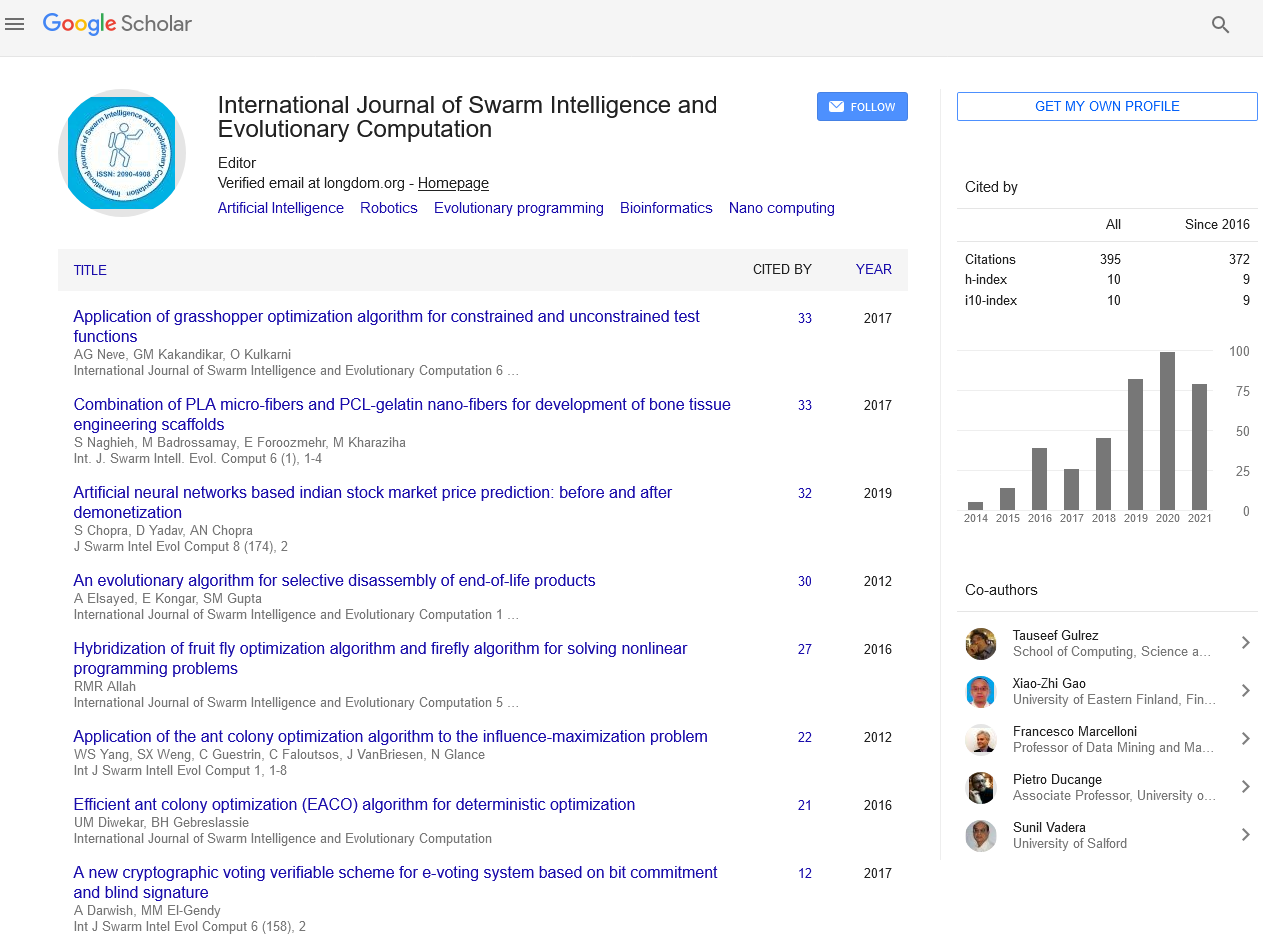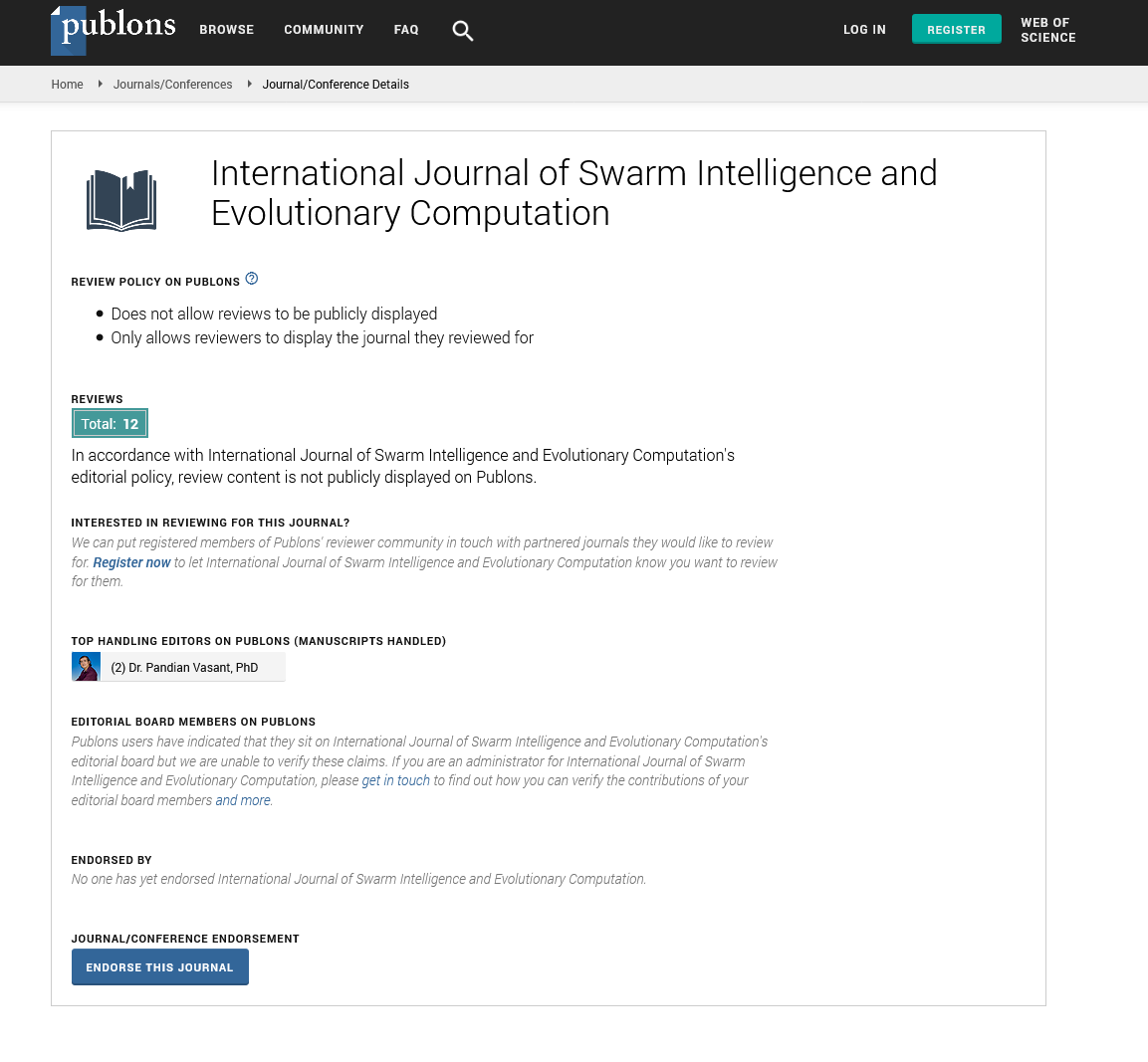Indexed In
- Genamics JournalSeek
- RefSeek
- Hamdard University
- EBSCO A-Z
- OCLC- WorldCat
- Publons
- Euro Pub
- Google Scholar
Useful Links
Share This Page
Journal Flyer

Open Access Journals
- Agri and Aquaculture
- Biochemistry
- Bioinformatics & Systems Biology
- Business & Management
- Chemistry
- Clinical Sciences
- Engineering
- Food & Nutrition
- General Science
- Genetics & Molecular Biology
- Immunology & Microbiology
- Medical Sciences
- Neuroscience & Psychology
- Nursing & Health Care
- Pharmaceutical Sciences
Perspective - (2024) Volume 13, Issue 1
Harnessing the Power of Hybrid Soft Computing for Complex Problem Solving
Peing Jein*Received: 03-Jan-2024, Manuscript No. SIEC-24-24956; Editor assigned: 05-Jan-2024, Pre QC No. SIEC-24-24956 (PQ); Reviewed: 19-Jan-2024, QC No. SIEC-24-24956; Revised: 26-Jan-2024, Manuscript No. SIEC-24-24956 (R); Published: 05-Feb-2024, DOI: 10.35248/2090-4908.24.13.352
Description
Hybrid soft computing, a synergy of different soft computing paradigms, has emerged as a potent approach for addressing complex real-world problems. In recent years, soft computing has gained significant attention as a powerful computational paradigm for tackling complex real-world problems. Traditional soft computing techniques, such as fuzzy logic, neural networks, evolutionary algorithms, and machine learning, have demonstrated effectiveness in various domains. However, no single technique is universally superior in all scenarios. Hybrid soft computing, which integrates multiple soft computing methods, has emerged as a promising approach to overcome the limitations of individual techniques and achieve superior performance in complex problem-solving tasks.
Theoretical foundations of hybrid soft computing
Fuzzy logic: Fuzzy logic provides a framework for dealing with uncertainty and vagueness by allowing for the representation of imprecise information through linguistic variables and fuzzy sets. Fuzzy logic-based systems excel in handling complex decisionmaking tasks where precise mathematical modeling is challenging.
Neural networks: Neural networks, inspired by the structure and function of the human brain, are powerful computational models capable of learning complex patterns and relationships from data. Neural networks exhibit remarkable capabilities in pattern recognition, classification, and prediction tasks, making them invaluable tools in various applications.
Evolutionary algorithms: Evolutionary algorithms, such as genetic algorithms, mimic the process of natural selection to iteratively evolve solutions to optimization problems. By employing mechanisms such as selection, crossover, and mutation, evolutionary algorithms can efficiently search large solution spaces and find near-optimal solutions.
Machine learning: Machine learning algorithms enable computers to learn from data and improve their performance over time without explicit programming. Supervised learning, unsupervised learning, and reinforcement learning are common paradigms in machine learning, each suited to different types of problems.
Methodologies of hybrid soft computing
Fuzzy neural networks: Fuzzy neural networks combine the expressive power of fuzzy logic with the learning capabilities of neural networks. By integrating fuzzy inference systems with neural network architectures, fuzzy neural networks can effectively handle uncertainty and learn complex mappings from input-output data pairs.
Neuro-fuzzy systems: Neuro-fuzzy systems integrate fuzzy logic with neural network techniques to create adaptive, self-learning systems capable of handling complex, uncertain, and nonlinear data. Neuro-fuzzy systems employ fuzzy inference mechanisms to interpret neural network outputs and provide interpretable, human-like reasoning.
Evolutionary neural networks: Evolutionary neural networks combine evolutionary algorithms with neural network structures to evolve optimal network architectures and connection weights for specific tasks. Through iterative evolution and selection, evolutionary neural networks can adapt and optimize neural network topologies and parameters for improved performance.
Ensemble methods: Ensemble methods leverage the diversity of multiple learning algorithms to improve prediction accuracy and generalization performance. By combining the predictions of multiple base models, ensemble methods can reduce variance, mitigate overfitting, and enhance strength.
Applications of hybrid soft computing
Predictive modeling: Hybrid soft computing techniques are widely used in predictive modeling tasks, including weather forecasting, stock market prediction, and medical diagnosis. By integrating multiple soft computing methods, predictive models can capture complex relationships in data and make accurate predictions.
Control systems: In control systems, hybrid soft computing approaches enable the design of adaptive, strong controllers capable of handling uncertainties and nonlinearities. Applications include autonomous vehicles, robotics, and industrial process control.
Optimization: Hybrid soft computing techniques play a vital role in optimization tasks, such as job scheduling, resource allocation, and parameter tuning. By combining evolutionary algorithms, fuzzy logic, and neural networks, optimization algorithms can efficiently search solution spaces and find nearoptimal solutions.
Pattern recognition: Hybrid soft computing methods are employed in pattern recognition tasks, including image recognition, speech recognition, and biometric identification. By integrating fuzzy logic with neural networks or evolutionary algorithms, pattern recognition systems can achieve high accuracy and robustness in challenging environments.
Challenges and future directions
While hybrid soft computing holds great promise for addressing complex real-world problems, several challenges remain to be addressed. These include algorithm scalability, interpretability, and computational efficiency. Future research directions may focus on developing advanced hybridization techniques, improving algorithmic performance, and addressing ethical considerations in algorithm design and deployment.
Conclusion
Hybrid soft computing offers a powerful and versatile approach to solving complex real-world problems by integrating multiple soft computing techniques. By leveraging the strengths of fuzzy logic, neural networks, evolutionary algorithms, and machine learning, hybrid soft computing enables robust, adaptive, and efficient problem-solving across diverse domains. Through continuous innovation and research, hybrid soft computing has the potential to revolutionize decision-making processes and address some of the most pressing challenges facing society today.
Citation: Jein P (2024) Harnessing the Power of Hybrid Soft Computing for Complex Problem Solving. Int J Swarm Evol Comput. 13:352.
Copyright: © 2024 Jein P. This is an open-access article distributed under the terms of the Creative Commons Attribution License, which permits unrestricted use, distribution, and reproduction in any medium, provided the original author and source are credited.


